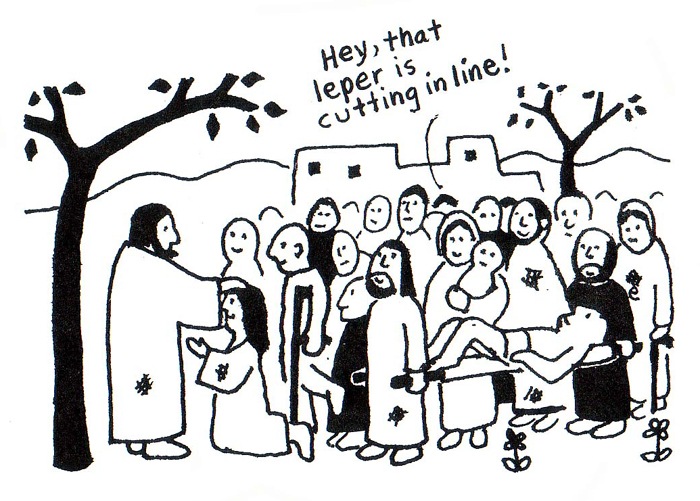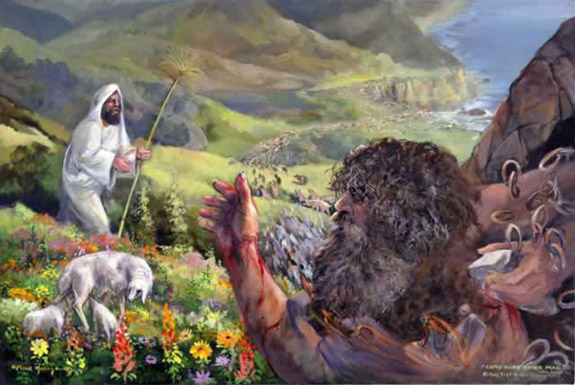If the gospels are true and Jesus arose from the dead, he also said that we could do greater works than he did when he was here. Some of the works are great works of compassion-- feeding and healing millions more than He did through feeding programs, hospitals and through great effort and compassionate wisdom.
But Jesus hasn't stopped working. He can, and does, heal today.
This doesn't mean that to see a doctor is a lack of faith. Jesus is happy to have us help each other and use what knowledge and resources we have to help the needy. But like the woman who saw many doctors and then came to Jesus, we will not be denied by Jesus.
Many who are ill, who have not obtained help by any-- go to Jesus. He can and will heal. He won't heal everyone, it is true. Some of us need to continue in our weakness. But others will be healed.
I had a terrible gallstone at one point, in which I would be in pain for hours, unable to get out of bed. I couldn't pay for a doctor. A group of healers prayed for me, and I was healed, the pain never returned.
A couple years later, I had another terrible pain. I was told by a doctor friend to go immediately to the hospital. They ended up taking out my appendix, which was on the verge of bursting. Then they paid for all the bills because I was poor.
Then I had a severe hormone imbalance, causing diabetes and muscle atrophy and the inability to deal with stress. I have prayed against it. I have sought doctor's help. I have struggled with many symptoms and severe depression because of it. But it didn't go away. Thanks to medication, it is reduced, but until I am healed from it (which may never happen in this life), I still deal with bad days.
Jesus worked in all these circumstances. In the first he healed me, just as he did in days of old. In the second, he used compassionate people to get me to the hospital and heal me and to have mercy on my inability to pay. In the third, I was told, as Paul, "My strength is made perfect through weakness" and I had to live with the consequences. But I receive daily grace to deal with it and to do Jesus' work despite it.
Jesus works in all circumstances, but we must ask and we must rely on Him, no matter what.
But Jesus hasn't stopped working. He can, and does, heal today.
This doesn't mean that to see a doctor is a lack of faith. Jesus is happy to have us help each other and use what knowledge and resources we have to help the needy. But like the woman who saw many doctors and then came to Jesus, we will not be denied by Jesus.
Many who are ill, who have not obtained help by any-- go to Jesus. He can and will heal. He won't heal everyone, it is true. Some of us need to continue in our weakness. But others will be healed.
I had a terrible gallstone at one point, in which I would be in pain for hours, unable to get out of bed. I couldn't pay for a doctor. A group of healers prayed for me, and I was healed, the pain never returned.
A couple years later, I had another terrible pain. I was told by a doctor friend to go immediately to the hospital. They ended up taking out my appendix, which was on the verge of bursting. Then they paid for all the bills because I was poor.
Then I had a severe hormone imbalance, causing diabetes and muscle atrophy and the inability to deal with stress. I have prayed against it. I have sought doctor's help. I have struggled with many symptoms and severe depression because of it. But it didn't go away. Thanks to medication, it is reduced, but until I am healed from it (which may never happen in this life), I still deal with bad days.
Jesus worked in all these circumstances. In the first he healed me, just as he did in days of old. In the second, he used compassionate people to get me to the hospital and heal me and to have mercy on my inability to pay. In the third, I was told, as Paul, "My strength is made perfect through weakness" and I had to live with the consequences. But I receive daily grace to deal with it and to do Jesus' work despite it.
Jesus works in all circumstances, but we must ask and we must rely on Him, no matter what.
















